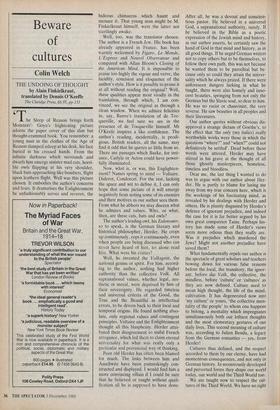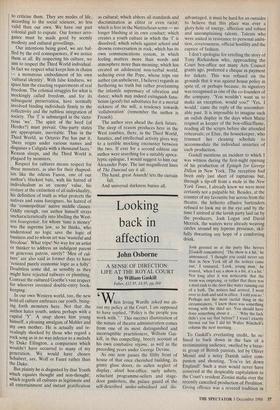Beware of cultures
Colin Welch
THE UNDOING OF THOUGHT by Alain Finkielkraut, translated by Dennis O'Keeffe The Claridge Press, £6.95, pp.I33 The Sleep of Reason brings forth Monsters': Goya's frightening picture adorns the paper cover of this slim but thought-crammed book. You remember: a young man in the clothes of the Age of Reason slumped asleep at his desk, his face buried in his crossed hands. From the infinite darkness which surrounds and dwarfs him emerge sinister mad cats, horri- ble owls flapping at his very shoulder, black bats approaching like bombers, flight upon leathern flight. Well was this picture chosen. It embodies the author's concerns and fears. It dramatises the Enlightenment he unfashionably serves and reveres, the
hideous chimaeras which haunt and menace it. That young man might be M. Finkielkraut himself, were the latter not startlingly awake.
Well', too, was the translator chosen. The author is a French Jew. His book has already appeared in France, has been warmly welcomed by Figaro , Le Monde, L'Express and Nouvel Observateur and compared with Allan Bloom's Closing of the American Mind. It is impossible to praise too highly the vigour and verve, the lucidity, concision and eloquence of the author's style. How is it possible to praise it at all without reading the original? Well, these qualities appear most vividly in the translation, through which, I am con- vinced, we see the original as through a clean window. When we admire felicities in, say, Reeve's translation of de Toc- queville, we feel sure we are in the presence of de Tocqueville himself. Mr O'Keefe inspires a like confidence. The author's reading, incidentally, is prodi- gious. British readers, all the same, may find it odd that he quotes so little from us. There are passages which Burke, for inst- ance, Carlyle or Acton could have power- fully illuminated.
Now, what is, or was, this Englighten- ment? Names spring to mind — Voltaire, Diderot, Condorcet. For the rest, lacking the space and wit to define it, I can only hope that some picture of it will emerge negatively from noting some of its enemies and their motives as our author sees them. From what he abhors we may discern what he admires and values. Who, or what, then, are these cats, bats and owls?
The author's leading owl, his Eulenvater, so to speak, is the German literary and historical philosopher, Herder. He crops up continuously, cops it continuously, even when people are being discussed who can never have heard of him. let alone read him. What were his crimes?
Well, he invented the Volksgeist, the national genius or spirit. For him, accord- ing to the author, nothing had higher authority than the collective Volk. All supranational values, whether legal, aes- thetic or moral, were deprived by him of their sovereignty. He regarded timeless and universal criteria of the Good, the True and the Beautiful as intellectual errors, to be driven back to their local and temporal origins. He found nothing abso- lute, only regional values and contingent principles. Voltaire and the Enlightenment thought all this blasphemy. Herder attri- buted their disagreement to sinful French arrogance, which led them to claim eternal universality for what was really only a particular and provisional way of thinking.
Poor old Herder has often been blamed for much. The links between him and Auschwitz have been painstakingly con- structed and displayed. I would find him a more convincing villain if I could be sure that he believed or taught without quali- fication all he is supposed to have done. After all, he was a devout and conscien- tious pastor. He believed in a universal God, a supranational authority, surely. If he believed in the Bible as a poetic expression of the Jewish mind and history, as our author asserts, he certainly saw the hand of God in that mind and history, as in all good things. If he urged German writers not to copy others but to be themselves, to follow their own path, this was not because he wanted them to be parochial but be- cause only so could they attain the univer- sality which he always prized. If there were unforeseen dangers lurking in what he taught, there were also homely and inno- cent beauties, springing from not only the German but the Slavic soul, so dear to him. He was no racist or chauvinist, the very reverse. He saw beauties in all peoples and their literatures.
Our author quotes without obvious dis- approval a strange dictum of Goethe's, to the effect that 'the only (my italics) really worthwhile works were those in which the questions "where?" and "when?" could not definitively be settled'. Dead before these words were uttered, Herder may have stirred in his grave at the thought of all those ghostly masterpieces, homeless, timeless and bloodless.
Dear me, the last thing I wanted to do was to argue with our author about Her- der. He is partly to blame for luring me away from my true concern here, which is the workings of his fascinating mind, as revealed by his dealings with Herder and others. He is plainly disgusted by Herder's defence of ignorant prejudice, and indeed the case for it is far better argued by his own great compatriot Taine. Perhaps his- tory has made some of Herder's views seem more odious than they really are. Was it prejudice which murdered the Jews? Might not another prejudice have saved them?
What fundamentally repels our author is the spectacle of great scholars and teachers bowing down for various false reasons before the local, the transitory, the ignor- ant, before das Volk, the collective, the mindless, before 'culture' or 'cultures' as they are now defined. Culture used to mean high thought, the life of the mind, cultivation. It has degenerated now into 'my culture' or yours, 'the collective men- tality of the people' to whom one happens to belong, a mentality which impregnates simultaneously both our loftiest thoughts and the most elementary gestures of our daily lives. This second meaning of culture was, according to Julien Benda, a legacy from the German romantics — yes, from Herder!
Cultures thus defined, and the respect accorded to them by our clerisy, have had momentous consequences, and not only in German history. In monstrously developed and perverted forms they shape our world today, our world and the Third World too.
We are taught now to respect the cul- tures of the Third World. We have no right to criticise them. They are modes of life, according to the social sciences, no less valid than our own. We have our past colonial guilt to expiate. Our former arro- gance must be made good by seemly modesty and cultural grovellings.
Our intentions being good, we are baf- fled by the evil consequences, if we notice them at all. By respecting his culture, we aim to respect the Third World individual. In fact we respect what keeps him in chains — a monstrous embodiment of his own 'cultural identity'. With false kindness, we spare him the exacting requirements of real freedom. The colonial struggles for what is mockingly called freedom, and for its subsequent preservation, have normally involved binding individuals firmly to the collectivity and the ruthless integration of society. The 'I' is submerged in the victo- rious 'we'. The spirit of the herd (of Herder?) must prevail. One-party states are appropriate, inevitable. Thus in the Third World, as Octavio Paz has put it, 'there reigns under various names and disguises a Caligula with a thousand faces.' Reason sleeps, and the Third World is plagued by monsters.
Respect for cultures means respect for these monsters, as also for their rhapsod- ists like the odious Fanon, one of our author's blackest bats, with his hatred of individualism as an 'enemy' value, his ecstasy at the extinction of all individuality, his definition of truth as what protects the natives and ruins foreigners, his hatred of the 'cosmopolitan' native middle classes. Oddly enough, our author himself strays uncharacteristically into libelling the West- ern bourgeoisie, for whom 'time is money' was the supreme law, so he thinks, who understood no logic save the logic of business and to whom art was 'wasteful and frivolous'. What tripe! No way for an artist or thinker to address an indulgent parent or generous patron, surely? 'Men of cul- ture' are also said in former days to have 'resisted purely economic logic as a folly'. Doubtless some did, as sensibly as they might have rejected railways or plumbing. Contrast the cultured Goethe's vast respect for whoever invented double-entry book- keeping.
In our own Western world, too, the new hold-all culture embraces our youth, bring- ing forth monsters here. Not that the author hates youth, unless perhaps with a capital 'Y'. A snap shows him young himself, a pleasing amalgam of Mahler and my own mother. He is actually and re- vealingly shocked by those who regard a rock song as in no way inferior to a melody by Duke Ellington, a comparison which wouldn't have occurred to many of my generation. We would have chosen Schubert, say, Wolf or Faure rather than the Duke.
But plainly he is disgusted by that Youth Which equates thought and non-thought; which regards all cultures as legitimate and all entertainment and instant gratification as cultural; which abhors all standards and discrimination as elitist or even racist; which is free in the Nietzschean sense — no longer blushing at its own conduct; which creates a youth culture in which the 'I' is dissolved; which rebels against school and drowns conversation in rock; which has its own communications system, in which feeling matters more than words and atmosphere more than meaning; which has created an adolescent non-verbal world, seducing even the Pope, whose trips our author (an unbeliever, I believe) regards as furthering no truth but rather proclaiming the infantile supremacy of vibration and dance; which may indeed extinguish fana- ticism (good) but substitutes for it a mortal sickness of the will, a tendency towards 'collaboration' (remember the author is French).
The author sees ahead the dark future. The sleep of reason produces here in the West zombies, there, in the Third World, fanatics, and intellectual activity gives way to a terrible mocking encounter between the two. If ever for a second edition our author were searching for a suitably apoca- lyptic epilogue, I would suggest to him our Alexander Pope. The last magnificent lines of The Dunciad say it all:
Thy hand, great Anarch! lets the curtain fall, And universal darkness buries all.



































































 Previous page
Previous page